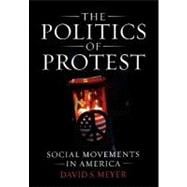
Note: Supplemental materials are not guaranteed with Rental or Used book purchases.
Purchase Benefits
What is included with this book?
| Preface | p. vi |
| Introduction | p. 1 |
| America and Political Protest: Political Institutions and Dissent | p. 7 |
| Why Protest? The Origins of Movements, Opportunities, and Organizations | p. 23 |
| Becoming an Activist | p. 44 |
| Individuals, Movements, Organizations, and Coalitions | p. 60 |
| The Strategy and Tactics of Social Protest | p. 80 |
| Civil Disobedience | p. 102 |
| The State and Protests: Institutionalization | p. 123 |
| When Everyone Protests | p. 144 |
| The Policy Connection: How Movements Matter | p. 162 |
| Protest and American Politics: What's Next? | p. 181 |
| References | p. 189 |
| Index | p. 201 |
| Table of Contents provided by Ingram. All Rights Reserved. |
The New copy of this book will include any supplemental materials advertised. Please check the title of the book to determine if it should include any access cards, study guides, lab manuals, CDs, etc.
The Used, Rental and eBook copies of this book are not guaranteed to include any supplemental materials. Typically, only the book itself is included. This is true even if the title states it includes any access cards, study guides, lab manuals, CDs, etc.